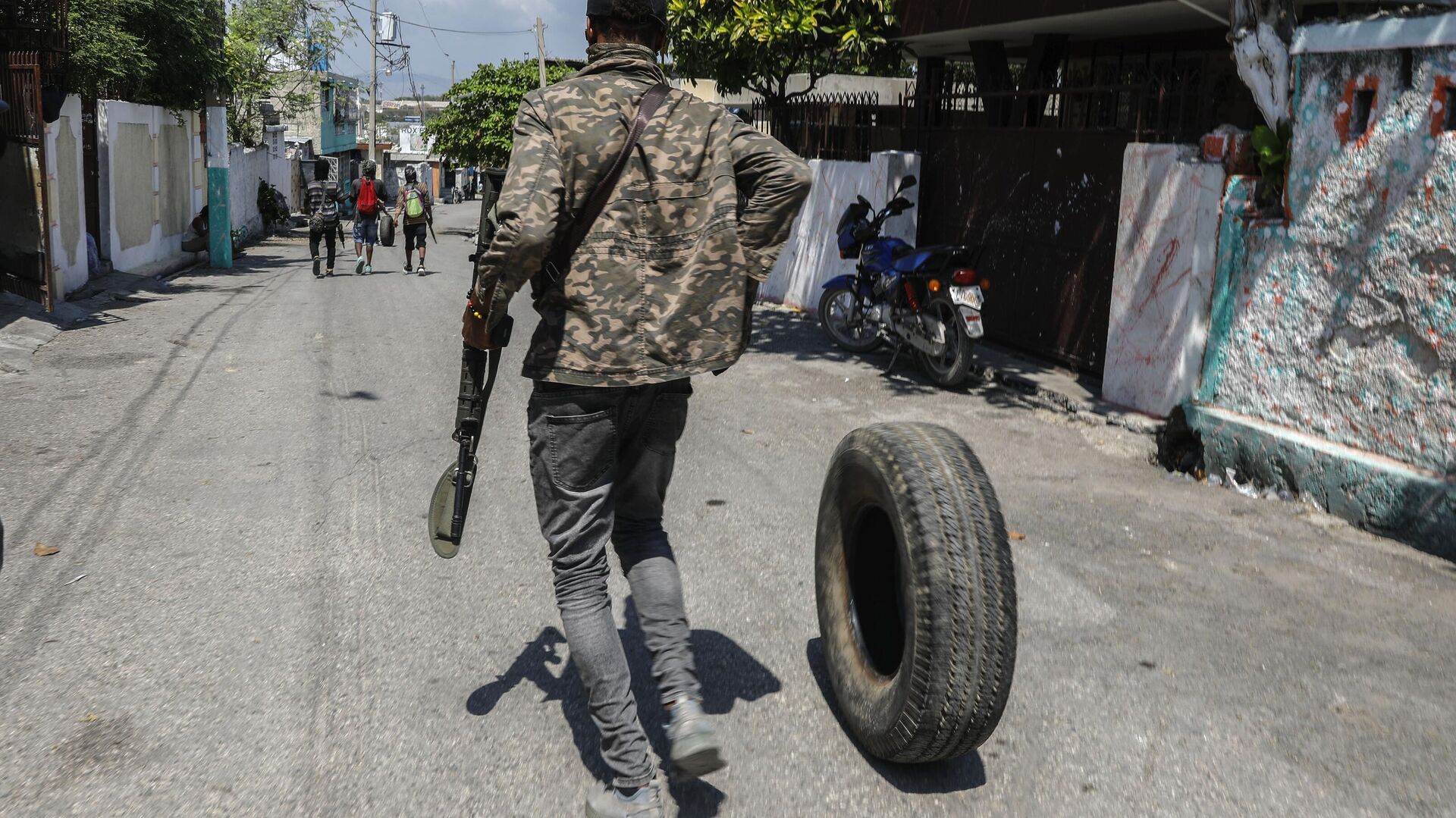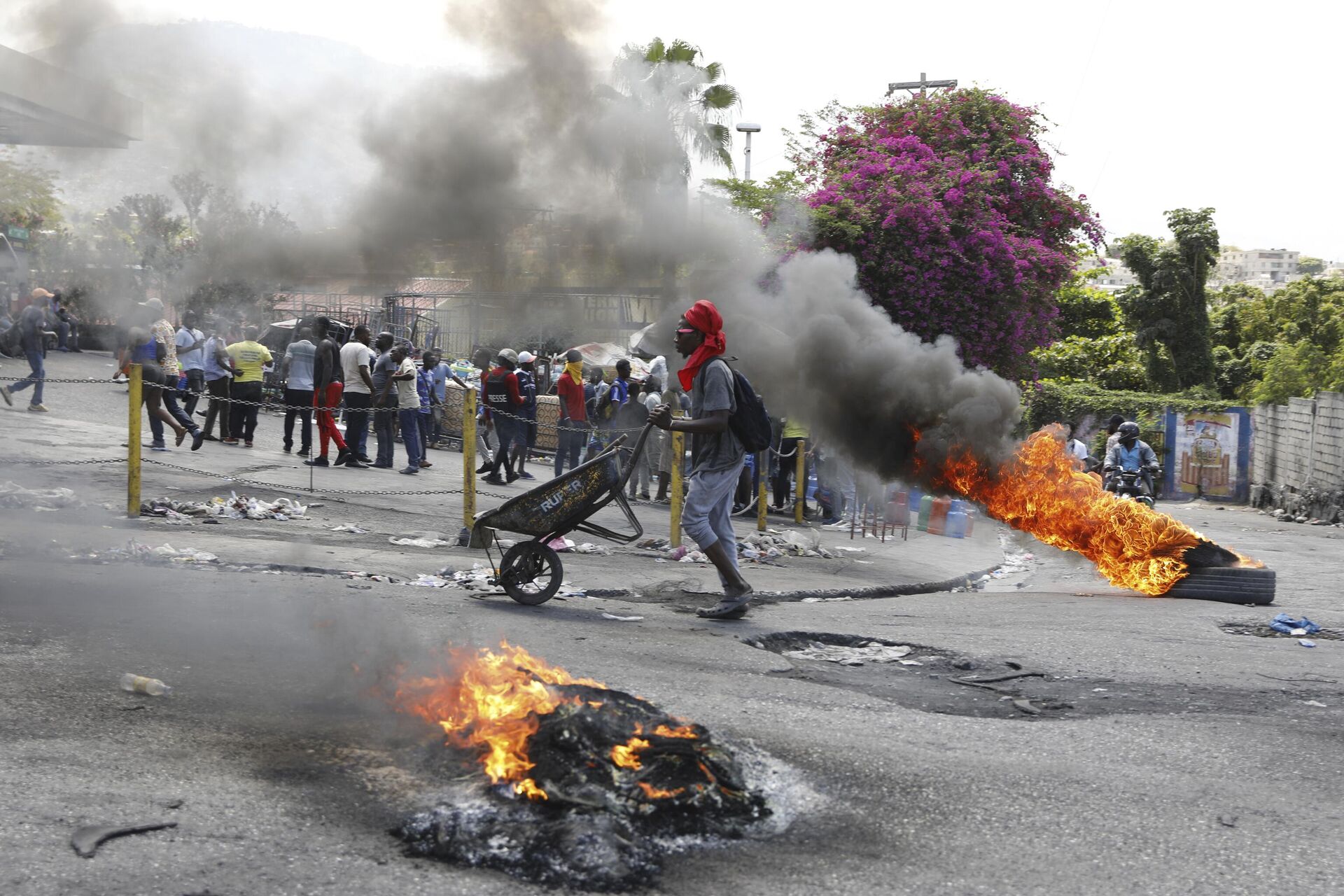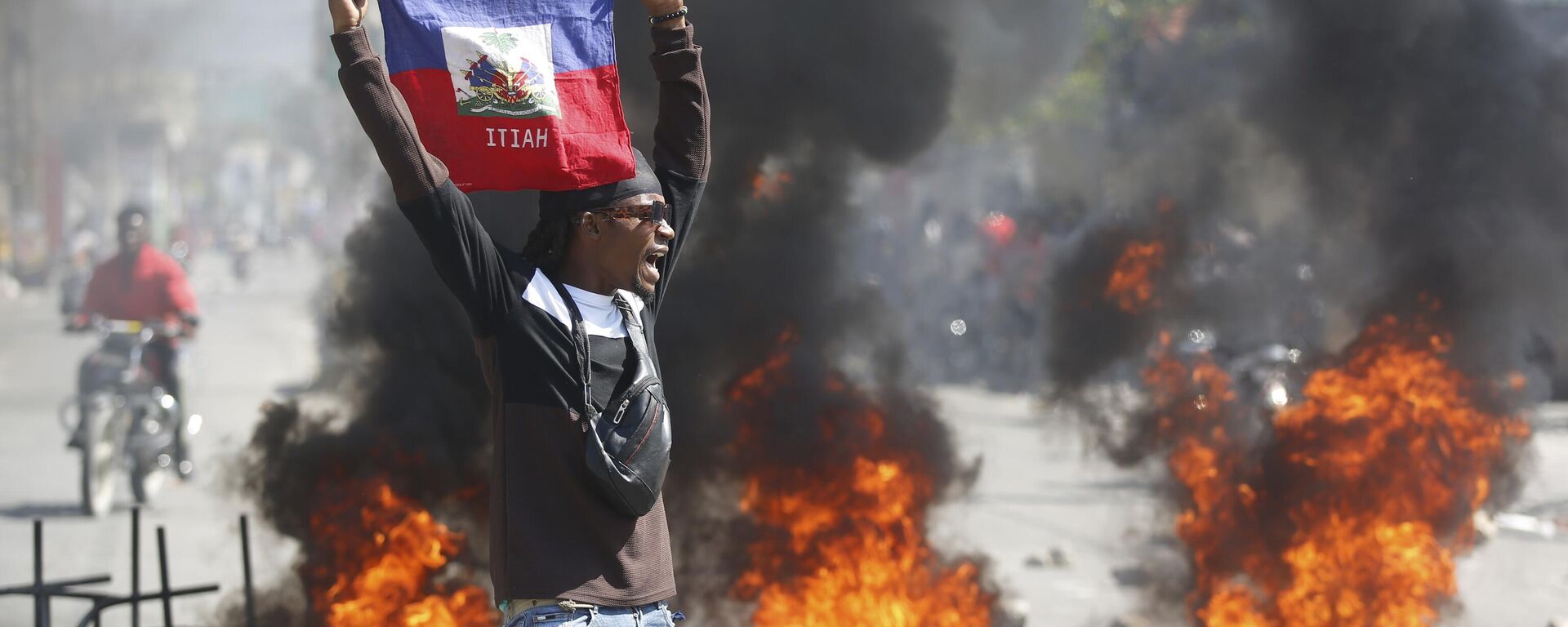https://en.sputniknews.africa/20240312/crisis-hit-haiti-witnesses-us-double-game-amid-risks-to-regional-stability-1065502929.html
Crisis-Hit Haiti Witnesses US 'Double Game' Amid Risks to Regional Stability
Crisis-Hit Haiti Witnesses US 'Double Game' Amid Risks to Regional Stability
Sputnik Africa
After an emergency meeting of the Caribbean Community, Haitian Prime Minister Ariel Henry has decided to step down from his position amidst the continued... 12.03.2024, Sputnik Africa
2024-03-12T14:38+0100
2024-03-12T14:38+0100
2024-03-12T16:09+0100
antony blinken
haiti
united states (us)
mexico
united nations (un)
us state department
international
https://cdn1.img.sputniknews.africa/img/07e8/03/0c/1065503107_0:121:3213:1928_1920x0_80_0_0_b75f4d86749b8971e62c396a93611d80.jpg
The spiraling social, economic, and political crisis in Haiti is a flashing "red light" threatening to spill over and affect neighboring countries and regions, international affairs analyst Rocío Méndez Bautista, of the National Autonomous University of Mexico (UNAM), told Sputnik.The consequences of this wave of violence for Haiti range from the forced displacement of millions of people to an increase in the number of homicides. Unless swift action is taken, besides Haiti becoming a "failed state," the situation could spread to other nations, Méndez Bautista reflected.Haiti's old ties with Washington, which has been quick to offer pledges of fiscal assistance to Port-au-Prince, might only aggravate the situation further, Méndez Bautista added. Henry's critics say he had no legitimate right to his position, accusing the US and its allies of trying to sustain a corrupt elite.Whether it was Washington's years of direct military occupation (1915 -1934), multinational military intervention such as Operation Uphold Democracy in 1994, or the economic dependence generated by providing Haiti with weapons and money, US involvement in the country has left an indelible scar of violence.The Caribbean state's economic dependence on Washington in the current spiral of chaos and political fragility is fraught with further grave consequences, pundits have told Sputnik. It should be noted that Ariel Henry confirmed his resignation in a telephone conversation on Monday with US Secretary of State Antony Blinken, who was in Jamaica for an emergency Caribbean meeting on Haiti. Blinken promised an additional $100 million for a United Nations-backed force to bring order to the chaos-gripped country, along with $30 million worth of humanitarian assistance. The US pledges of fiscal assistance came with “a proposal developed in partnership with CARICOM and Haitian stakeholders to expedite a political transition through a creation of a broad based, independent presidential college”, as per the US State Department.Haiti has long been mired in a social and political crisis, which escalated after the assassination of President Jovenel Moise on July 7, 2021. With backing from the US, Ariel Henry at the time took over the post of PM without being elected. Promised elections were put on the back-burner, while gangs gained power. Things escalated in late February, as Henry went to Kenya to push through a deal to deploy foreign forces in his country to fight organized crime. An armed gang stormed Haiti's largest prison, letting the inmates loose. The gangs said their goal was to prevent Henry from returning to Haiti, as they blocked the main airport, preventing the PM's plane from landing on March 5. Accordingly, Henry headed for Puerto Rico instead.A state of emergency was set in place in Port-au-Prince and the surrounding region. By the time Henry opted to step down, the gangs were believed to be in control of 80 percent of Port-au-Prince. Ex-police officer-turned-gang leader Jimmy "Barbecue" Cherizier, who is accused of fueling violence in Haiti, announced that “if Henry doesn’t the resign and if the international community continues to support him,” the country would be heading for a civil war that would lead to genocide.Besides nearly half of its population suffering food insecurity, data released by the United Nations shows that more than 8,400 people in Haiti were victims of gang violence last year. Nearly 200,000 people were displaced in 2023, and close to 15,000 fled Haiti in the last week of February 2024.
https://en.sputniknews.africa/20240308/haiti-prolongs-state-of-emergency-in-capital-region-until-april-after-spike-in-violence-1065447823.html
haiti
united states (us)
mexico
Sputnik Africa
feedback@sputniknews.com
+74956456601
MIA „Rossiya Segodnya“
2024
News
en_EN
Sputnik Africa
feedback@sputniknews.com
+74956456601
MIA „Rossiya Segodnya“
Sputnik Africa
feedback@sputniknews.com
+74956456601
MIA „Rossiya Segodnya“
antony blinken, haiti , united states (us), mexico, united nations (un), us state department, international
antony blinken, haiti , united states (us), mexico, united nations (un), us state department, international
Crisis-Hit Haiti Witnesses US 'Double Game' Amid Risks to Regional Stability
14:38 12.03.2024 (Updated: 16:09 12.03.2024) After an emergency meeting of the Caribbean Community, Haitian Prime Minister Ariel Henry has decided to step down from his position amidst the continued turmoil in the country. CARICOM revealed that Henry would officially resign once a transitional presidential council is in place and an interim prime minister is named.
The spiraling social, economic, and political crisis in Haiti is a flashing "red light" threatening to spill over and affect neighboring countries and regions, international affairs analyst Rocío Méndez Bautista, of the National Autonomous University of Mexico (UNAM), told Sputnik.
The consequences of this wave of violence for
Haiti range from the forced displacement of millions of people to an increase in the number of homicides. Unless swift action is taken, besides Haiti becoming a "
failed state," the situation could spread to other nations, Méndez Bautista reflected.
"[Haiti] is a 'red light' in the Caribbean which requires a great deal of attention to prevent this crisis from spreading to other regions. It is a situation that has gotten out of control," the academic pointed out.
Haiti's old ties with Washington, which has been quick to offer pledges of fiscal assistance to Port-au-Prince, might only aggravate the situation further, Méndez Bautista added.
"The Haitian gangs are reluctant [towards intervention of other countries] because the United States recognizes Henry's government; they blame Washington for this undemocratic administration. Likewise, the exodus of people can reach Miami, and even Mexico [...]. Furthermore, gang members could infiltrate, triggering instability [on United States territory]," Méndez Bautista explained.
Henry's critics say he had no legitimate right to his position, accusing the US and its allies of trying to sustain a corrupt elite.
Whether it was Washington's years of direct military occupation (1915 -1934), multinational military intervention such as Operation Uphold Democracy in 1994, or the economic dependence generated by providing Haiti with weapons and money, US involvement in the country has left an indelible scar of violence.
The Caribbean state's economic dependence on Washington in the current spiral of chaos and political fragility is fraught with further grave consequences, pundits have told Sputnik.
It should be noted that Ariel Henry confirmed his resignation in a telephone conversation on Monday with US Secretary of State Antony Blinken, who was in Jamaica for an emergency Caribbean meeting on Haiti. Blinken promised an additional $100 million for a United Nations-backed force to bring order to the chaos-gripped country, along with $30 million worth of humanitarian
assistance. The US pledges of fiscal assistance came with “
a proposal developed in partnership with CARICOM and Haitian stakeholders to expedite a political transition through a creation of a broad based, independent presidential college”, as per the US State Department.
"We are witnessing a double game, double rhetoric. On the one hand, there is humanitarian problem with shelters and everything that follows from this. And on the other hand, a military buildup, which is manifest not in the United States sending troops, but in funneling money and weapons to continue to multiply the internal war," Colombian researcher Marcela Landazábal Mora, doctor in Latin American Studies, previously told Sputnik.
Haiti has long been mired in a social and political crisis, which escalated after the
assassination of President Jovenel Moise on July 7, 2021. With backing from the US, Ariel Henry at the time took over the post of PM without being elected. Promised elections were put on the back-burner, while gangs gained power. Things escalated in late February, as Henry went to Kenya to push through a deal to deploy foreign forces in his country to fight organized crime. An armed gang stormed Haiti's largest prison, letting the inmates loose. The gangs said their goal was to prevent Henry from returning to Haiti, as they blocked the main airport, preventing the PM's plane from landing on March 5. Accordingly, Henry headed for Puerto Rico instead.
A state of emergency was set in place in
Port-au-Prince and the surrounding region. By the time Henry opted to step down, the gangs were believed to be in control of 80 percent of Port-au-Prince. Ex-police officer-turned-gang leader Jimmy "Barbecue" Cherizier, who is accused of fueling violence in Haiti, announced that “
if Henry doesn’t the resign and if the international community continues to support him,” the country would be heading for a civil war that would lead to genocide.
Besides nearly half of its population suffering food insecurity, data released by the United Nations shows that more than 8,400 people in Haiti were victims of gang violence last year. Nearly 200,000 people were displaced in 2023, and close to 15,000 fled Haiti in the last week of February 2024.



